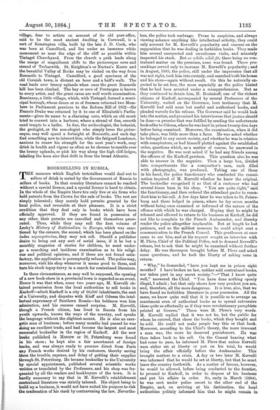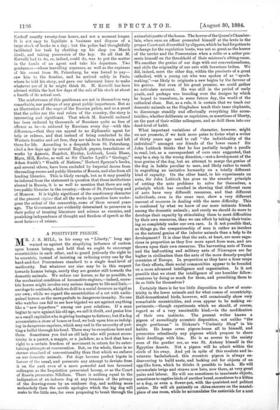BOOKSELLING IN RUSSIA.
THE measure which English teetotallers would deal out to sellers of drink is meted by the Government of Russia to sellers of books. In that country literature cannot be reached without a special licence, and a special licence is hard to obtain. In the whole of the Empire there are only five or six firms who hold patents from the Crown for the sale of books. The rest are simply tolerated ; they merely hold permits granted by the local police, and revocable at their pleasure. It is a strict condition that they deal only in books which have been officially approved. If they are found in possession of any other, their permits are cancelled and themselves prose- onted. Thus, while they may sell the first volume of Lecky's History of Rationalism in Europe, which was sanc- tioned by the censors, the second, which has been placed on the jaw expurgatorius, they may not sell. Should a publisher desire to bring out any sort of serial issue, if it be but a monthly magazine of stories for children, he must under- go a searching and insidious examination as to his religi- ous and political opinions, and if these are not found satis- factory, the application is peremptorily refused. The police may, moreover, visit his shop whenever it seems good to them, and turn his stock topsy-turvy in a search for contraband literature.
In these circumstances, as may well be supposed, the opening of a new book-store in a provincial town is regarded as an event. Hence it was that when, some two years ago, M. Kervelli ob- tained permission from the local authorities to sell books in ,Karkoff—albeit Karkoff is a city of 60,000 inhabitants, the seat of a University, and disputes with Kieff and Odessa the intel- leotnal supremacy of Southern Russia—his boldness won him admiration, and his success caused surprise. M. Kervelli, though a French citizen, has lived in Russia from his youth upwards, knows the ways of the country, and speaks the language without the slightest accent. He is also an ener- getic man of business; before many months had passed he was doing an excellent trade, and had become the largest and most successful bookseller in the region of Karkoff. All the new books published in Moscow or St. Petersburg were found in his store ; he kept also a fair assortment of foreign books, and was always ready to procure direct from Paris any French works desired by his customers, thereby saving them the trouble, expense, and delay of getting their supplies through St. Petersburg. He became bookseller to the University by special appointment, published several scientific works written or translated by the Professors, and his shop was fre- quented by all the readers and bookbnyers of the town. It is hardly necessary to say that in M. Kervelli's establishment contraband literature was strictly tabooed. His object being to build up a business, it would not have suited his purpose to risk the confiscation of his stock by contravening the law. Neverthe- less, the police took umbrage. Prone to suspicion, and always viewing askance anything like intellectual activity, they could only account for M. Kervelli's popularity and success on the supposition that he was dealing in forbidden books. They made him several unexpected and unwelcome visits, and minutely inspected his stock. But ex nihilo nihil fit; there being no con- traband matter on the premises, none was found. These pro- ceedings served only to increase M. Kervelli's popularity ; and in August, 1883, the police, still under the impression that all was not right, took him into custody, and searched both his house and his store—again without result. On this he naturally ex- pected to be set free, the more especially as the police hinted that he had been arrested under a misapprehension. But as they continued to detain him, M. Boutakoff, one of the richest citizens of Karkoff, accompanied by several Professors of the University, waited on the Governor, bore testimony that M. Kervelli had sold none but useful and authorised books, and pleaded warmly for his release. The Governor said he would look into the matter, and promised his interviewers that justice should be done—a promise that was fufilled by sending the unfortunate bookseller to Odessa, where he was kept in prison twenty-five days before being examined. Moreover, the examination, when it did take place, was little more than a farce. He was asked whether he belonged to any secret society, and whether he was in relation
with conspirators, or had himself plotted against the established. order, questions which, as a matter of course, he answered in the negative. He was next asked if he had any friends among the officers of the Karkoff garrison. This question also he was able to answer in the negative. Then a large box, divided into compartments like a compositor's case, each filled with photographs, was produced. Taking one of these in his hand, the police functionary who conducted the exami- nation inquired of M. Kervelli whether he knew the original.
The bookseller recognised it as that of a customer who had several times been in his shop. " You are quite right," said the functionary, and then ordered the attendant gaoler to recon- duct him to his cell. A few days later he was taken to St. Peters-
burg and there lodged in prison, where he lay seven months without being once examined or informed of the nature of the offence with which he was charged. Hoping that he might be released and allowed to return to his business at Karkoff, he did not like to complain to the French Ambassador, and thereby render the police altogether implacable. But at length he lost patience, and as the mildest measure he could adopt sent a communication to the French Consul. This gentleman at once came to see him, and at his request sought an interview with M. Pleve, Chief of the Political Police, not to demand Kervelli's release, but to ask that he might be examined without further delay. He was thereupon brought before M. Pleve and asked some questions, and he took the liberty of asking some in return.
" Why," he demanded, " have you kept me in prison eight months P I have broken no law, neither sold contraband books, nor taken part in any secret society."—" That I know quite well," answered the Chief. "You have done nothing openly illegal, I admit ; but that only shows how very prudent you are, and, therefore, all the more dangerous. It is true, also, that we have found no forbidden literature in your possession. All the same, we know quite well that it is possible so to arrange an assortment even of authorised books as to spread subversive ideas quite as effectually as if they were revolutionary pamphlets printed at Geneva." These were M. Pleve's very words. M. Kervelli replied that it was not he, but the public for whom he catered, that chose the books, which they bought and he sold. He could not make people buy this or that book. Moreover, according to the Chief's theory, the more innocent a man was, the more he deserved punishment, He was then taken back to his cell. On the Consul hearing what had come to pass, he informed M. Pleve that unless Kervelli were either set at liberty or put on his trial, he would bring the affair officially before the Ambassador. This brought matters to a crisis. A day or two later M. Kervelli was informed that he would be set at liberty, but that he must leave the country forthwith. As a matter of favour, however, he would be allowed, before being conducted to the frontier, to proceed to Karkoff, in order to dispose of his business and put his affairs in order. So, early in March (1884), he was sent under police escort to the other end of the Empire, and, on arriving at his destination, the local authorities politely informed him that he might remain in Karkoff exactly twenty-four hours, and not a moment longer. It is not easy to liquidate a business and dispose of a large stock of books in a day ; but the police had thoughtfully facilitated his task by shutting up his shop (on March 22nd), and taking possession of the key. So all that M. Kervelli had to do, or, indeed, could do, was to put the matter in the hands of an agent and take his departure. ,Two gendarmes—whose travelling expenses, as well as the expenses of his escort from St. Petersburg, he was forced to pay— saw him to the frontier, and he arrived safely in Paris, where be told his story, and gave our informant leave to make whatever use of it he might think fit. M. Kervelli has been advised within the last few days of the sale of his stock at about a fourth of its actual cost.
The misfortunes of this gentleman are not in themselves very remarkable, nor perhaps of any great public importance. But as an illustration of the ways of the Russian police, and as a proof that the police are the real rulers of the country, the story is interesting and significant. That which M. Kervelli endured has been endured by thousands of Russians quite as free of offence as he—is endured by Russians every day—with this difference,—that they can appeal to no diplomatic agent for help or redress, and that instead of being conducted to the Western frontier and set free, they are taken to Siberia and left there for life. According to a despatch from St. Petersburg, cited a few days ago by several English papers, translations of works by Agassiz, Bagehot, Huxley, Lubbock, Louis Blanc, Marx, Mill, Reclus, as well as Sir Charles Lyell's " Geology," Adam Smith's " Wealth of Nations," Herbert Spencer's books, and several others, have been excluded by Imperial decree from the reading-rooms and public libraries of Russia, and also from all lending libraries. This is likely enough, but as it may possibly be inferred from the statement in question that those institutions abound in Russia, it is as well to mention that there are only two public libraries in the country, those of St. Petersburg and of Moscow. It is highly significant of the reactionary character of the present regime that all the works in question have under- gone the ordeal of the censorship, some of them several years ago. The Government are evidently determined to persevere in their policy of treating literature and science as enemies, and punishing independence of thought and freedom of speech as the most heinous of crimes.



































 Previous page
Previous page